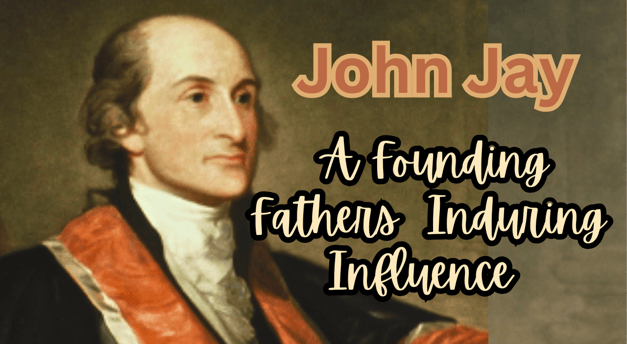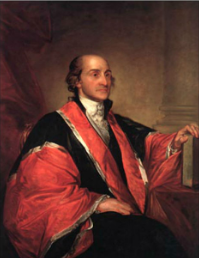John Jay: A Founding Father's Enduring Influence
John Jay (December 23, 1745 [O.S. December 12] – May 17, 1829) was a pivotal figure in early American history, whose contributions as a statesman, diplomat, abolitionist, and jurist helped shape the United States during its formative years. As a Founding Father, Jay played a critical role in securing the nation's independence and establishing its political and legal foundations. His legacy includes serving as the first Chief Justice of the United States, a signatory of the Treaty of Paris, and a leader of the Federalist Party.
Casey Adams
11/26/20237 min read


Early Life and Education
Born on December 12, 1745, in New York City, John Jay was the sixth of seven children in a prominent merchant family of French Huguenots.
His father, Peter Jay, was a successful trader whose wealth stemmed from transatlantic commerce, while his mother, Mary Van Cortlandt, hailed from a distinguished Dutch colonial family with deep roots in New York’s aristocratic landscape.
This privileged upbringing gave Jay access to elite social and intellectual circles, shaping his worldview and ambitions.
Jay’s early education was rigorous and reflective of the Enlightenment ideals that permeated colonial America.
Tutored at home by private instructors, he developed a strong foundation in classical literature, history, and languages, including Latin and Greek.
In 1760, at the age of 14, he enrolled at King’s College (now Columbia University), an institution known for its emphasis on legal and political education.
Graduating with distinction in 1764, Jay demonstrated an early aptitude for critical thinking and public discourse, qualities that would define his career.
Following his graduation, Jay studied law under Benjamin Kissam, a prominent New York attorney.
This apprenticeship exposed him to the intricacies of colonial legal systems and the growing tensions between British authorities and American colonists.
Admitted to the bar in 1768, Jay quickly established himself as a skilled lawyer, blending legal expertise with a commitment to public service—a hallmark of his later contributions to the American Revolution and the founding of the United States.
The Road to Revolution
Jay’s legal career coincided with escalating colonial unrest over British policies, particularly the Stamp Act of 1765 and subsequent measures that infringed on colonial autonomy.
His legal acumen and moderate temperament positioned him as a key figure in the burgeoning resistance movement.
In 1774, Jay was elected as a delegate to the First Continental Congress, where he emerged as a voice of reason amid growing radicalism.
His authorship of the Address to the People of Great Britain reflected his initial preference for reconciliation, appealing to shared Anglo-American values while critiquing British overreach.
At the Second Continental Congress in 1775, Jay continued to advocate for a measured response to British aggression, balancing calls for resistance with diplomatic overtures.
However, as British policies grew increasingly oppressive—culminating in the Intolerable Acts and the outbreak of hostilities at Lexington and Concord—Jay’s stance shifted decisively toward independence.
His intellectual rigor and diplomatic finesse made him a trusted leader among his peers.
In 1777, Jay played a pivotal role in drafting New York’s first state constitution, a document that balanced democratic principles with the need for stable governance.
As New York’s first Chief Justice, he further solidified his reputation as a legal and political visionary, laying the groundwork for the state’s judicial system while championing the Patriot cause.
Diplomatic Achievements:
The Treaty of Paris
John Jay’s diplomatic career reached its zenith during the American Revolution, where his strategic foresight and negotiating prowess proved instrumental in securing American independence.
In 1779, Congress appointed him minister to Spain, tasking him with securing financial and military support for the war effort.
Although Spain’s support was limited due to its own strategic interests, Jay’s time in Madrid honed his diplomatic skills and deepened his understanding of European power dynamics.
In 1782, Jay joined Benjamin Franklin and John Adams in Paris to negotiate the Treaty of Paris, which formally ended the Revolutionary War. Jay’s contributions were critical to the treaty’s success.
Recognizing the potential for French intermediaries to prioritize European interests over American ones, Jay insisted on direct negotiations with Britain—a bold move that ensured the United States secured favorable terms.
The treaty recognized American independence, established the Mississippi River as the western boundary, and granted fishing rights off Newfoundland, significantly expanding American territorial and economic prospects.
Jay’s diplomatic approach was rooted in pragmatism and a keen understanding of international law, qualities that earned him respect among European statesmen.
His ability to navigate complex geopolitical realities underscored his role as one of America’s most effective diplomats during its formative years.
Architect of the Constitution and Federalist Leader
After the Revolution, Jay turned his attention to the challenges of nation-building under the Articles of Confederation.
As Secretary of Foreign Affairs from 1784 to 1789, he confronted the limitations of the confederal government, particularly its inability to enforce treaties or regulate commerce effectively.
These frustrations fueled his advocacy for a stronger federal system, aligning him with other Federalist leaders like Alexander Hamilton and James Madison.
Jay’s contributions to The Federalist Papers—a series of essays advocating for the ratification of the U.S. Constitution—were limited but impactful.
He authored five essays (Nos. 2–5 and 64), focusing on foreign policy, national unity, and the dangers of foreign influence under a weak central government.
His arguments emphasized the need for a unified nation capable of defending its sovereignty and securing its place on the global stage.
Jay’s vision for a strong federal government was shaped by his experiences as a diplomat and jurist, as well as his belief in the Enlightenment principles of reason, order, and justice.
His work complemented the broader Federalist effort to address the structural weaknesses of the Articles of Confederation, paving the way for the adoption of the Constitution in 1788.
First Chief Justice of the United States
In 1789, President George Washington appointed John Jay as the first Chief Justice of the United States, recognizing his legal expertise and commitment to the rule of law.
As head of the newly established Supreme Court, Jay faced the monumental task of defining the judiciary’s role within the federal system.
His tenure laid foundational principles that continue to shape American jurisprudence.
One of Jay’s most significant decisions was Chisholm v. Georgia (1793), in which the Court ruled that citizens of other states could sue states in federal court.
This decision affirmed the supremacy of federal authority over state sovereignty, though it sparked controversy and ultimately led to the passage of the Eleventh Amendment, which limited federal jurisdiction in such cases.
Jay’s ruling reflected his belief in a robust federal judiciary capable of ensuring national unity and legal consistency.
Jay also championed judicial independence, insisting that the Supreme Court operate free from political interference.
His efforts to establish the Court as a coequal branch of government set enduring precedents, reinforcing the Constitution’s checks and balances.
The Jay Treaty and Controversy
In 1794, President Washington called upon Jay to negotiate a treaty with Britain to resolve lingering disputes from the Revolutionary War, including British interference with American shipping and the occupation of forts in the Northwest Territory.
The resulting Jay Treaty, signed in 1794, sought to avert war and stabilize Anglo-American relations during a period of heightened international tension, particularly with France.
The treaty achieved several key objectives:
Britain agreed to withdraw from the Northwest Territory, and mechanisms were established to address maritime disputes and compensate American merchants for losses.
However, the treaty was deeply unpopular among many Americans, particularly Jeffersonian Republicans, who viewed it as overly conciliatory toward Britain and a betrayal of America’s alliance with France.
Despite the controversy, the Jay Treaty secured critical peace and economic stability, allowing the young United States to focus on internal development.
Jay’s willingness to endure public criticism for the sake of national interest underscored his commitment to pragmatic diplomacy and long-term stability.
Governor of New York and Abolitionist Work
In 1795, Jay resigned from the Supreme Court to become the second governor of New York, a position he held until 1801.
As governor, he pursued progressive reforms that reflected his deep commitment to justice and social equity.
His most notable achievement was the passage of the Gradual Emancipation Act of 1799, which set New York on a path to abolish slavery by 1827.
This legislation was a landmark step toward aligning the state’s laws with the principles of liberty and equality espoused in the Declaration of Independence.
Jay’s abolitionist efforts were deeply personal and rooted in his moral convictions.
A founding member of the New York Manumission Society in 1785, he worked tirelessly to promote the emancipation of enslaved individuals and protect the rights of freed African Americans.
His advocacy for abolition, though gradualist in approach, positioned him as a pioneer in the fight against slavery, even as the institution persisted in other parts of the nation.
Later Years and Legacy
After retiring from public office in 1801, Jay retreated to his estate in Bedford, New York, where he lived quietly until his death on May 17, 1829.
Though he declined subsequent offers to return to public service, including an appointment as Chief Justice by President John Adams, Jay remained a respected elder statesman, consulted by political leaders and admired for his wisdom.
John Jay’s legacy is multifaceted and enduring. As a diplomat, he secured the peace and territorial integrity of the United States during its most vulnerable years.
As a jurist, he established foundational principles that continue to guide American law, emphasizing judicial independence and constitutional supremacy.
As a politician, he championed the Constitution and the rule of law, helping to shape the federal government’s structure and authority.
As an abolitionist, he worked to bridge the gap between the nation’s ideals and its practices, laying the groundwork for future generations to confront the moral challenges of slavery.
Conclusion
John Jay’s life exemplifies the values of leadership, integrity, and dedication to the public good. His contributions as a Founding Father, diplomat, and statesman were instrumental in shaping the United States during its formative years.
Though often overshadowed by contemporaries like George Washington, Alexander Hamilton, and Thomas Jefferson, Jay’s legacy endures as a testament to his unwavering commitment to justice, national unity, and the principles of liberty.
His life serves as a reminder of the profound impact that principled leadership can have on the course of history, offering lessons for contemporary leaders and citizens alike.
This revised version provides a more detailed, nuanced, and contextually rich exploration of John Jay’s life.
It emphasizes his intellectual and moral contributions while situating his actions within the broader historical and political landscape.
It also highlights lesser-known aspects of his legacy, such as his abolitionist work, to offer a more comprehensive portrait of his impact.
References:
Ellis, Joseph J. "American Dialogue: The Founders and Us." Vintage, 2018.
Ferling, John. "John Adams: A Life." Oxford University Press, 2010.
Stahr, Walter. "John Jay: Founding Father." Houghton Mifflin Harcourt, 2006.
Wood, Gordon S. "Empire of Liberty: A History of the Early Republic, 1789-1815." Oxford University Press, 2009.



John Jay

